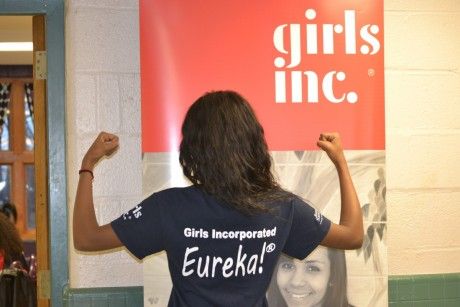
This summer, Amy Bennett led high school students through a mathematics program called Eureka!, which is an affiliate of Girls Inc. of Lincoln.
Girls Inc. encourages the development of academic commitment and self-confidence for students in the Lincoln community, and Eureka! focuses on developing skills in the STEM field. When teaching mathematics, Bennett, a postdoctoral faculty member in the University of Nebraska-Lincoln Department of Mathematics, aims to reduce students’ fear and anxiety surrounding the subject.
Two cohorts of students participated in the two-week summer program. Bennett led a cohort of high school girls beginning their sophomore year.
“They loved to joke with one another and tease me about ‘being alive in the 1900s’ but maybe most importantly, they were incredibly supportive of one another and willing to learn new, challenging things,” Bennett said.
The other cohort was taught by Nebraska mathematics graduate student Emily McMillon. McMillon used resources from nationally known math educator Jo Boaler and Boaler’s website youcubed.org, including an activity that explored and debunked some myths about the qualities of people who are “good at math.” Bennett also met with Eureka! program coordinator Brooke Crider before the camp to learn more about it and share ideas with McMillon.
The program led students through activities that differed from traditional math topics covered in schools, such as exploring: numbers in other bases; a Mobius strip and torus and constructing a hexaflexagon; topology with playdoh by morphing donuts to coffee mugs; the Sheldon Art Museum to measure the head sculpture and find the height of the person who belongs to it; geometry and fairness in gerrymandered districts; graph theory with the Konigsberg Bridges problem and map colorability theorems; and the card games SET and Spot It!.
“I think the girls thought it was really cool that they were learning college-level math, and it added to this notion that they were capable of enjoying and being successful in math. Just having multiple role models around them who are excited about STEM fields and seeing real-life examples of women in math-related careers will make a positive impact on their futures,” Bennett said.
The program incorporated mathematics activities that suited all ages, with activities that can be used with first-graders (such as map colorability) as an introduction to validating claims and finding counterexamples, all the way to collegiate mathematics concepts such as proportional reasoning that only rely on middle-school-level understanding (such as finding the height of the Sheldon Museum person).
Bennett said she hopes the camp allowed the students to see “a ‘mathematician’ doesn’t have to look or think one particular way.”
- Tori Pedersen, senior, UNL CSMCE
Learn more about Amy Bennett in this Q&A